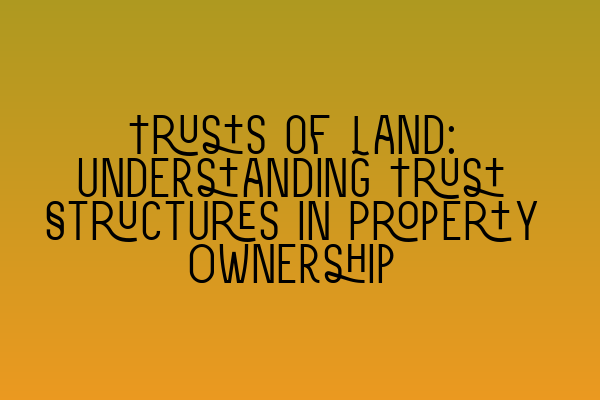Trusts of Land: Understanding Trust Structures in Property Ownership
Welcome to the SQE Property Law & Land Law blog, where we aim to provide you with expert insights and valuable information about various legal aspects related to property ownership. In this article, we will delve into the world of trusts of land, exploring the different trust structures commonly used in property transactions.
A trust is a legal arrangement that allows a person, known as the trustee, to hold and manage assets on behalf of another person or group of people, known as the beneficiaries. When it comes to property ownership, trusts can play a crucial role, providing flexibility, protection, and tax advantages.
Let’s start by understanding the basics. In any trust, there are three key parties involved: the settlor, the trustee, and the beneficiaries. The settlor is the person who creates the trust and transfers their property or assets into it. The trustee is responsible for managing the trust and carrying out the settlor’s instructions. The beneficiaries are the individuals who will ultimately benefit from the trust.
One commonly used trust structure in property ownership is the bare trust. In a bare trust, the legal title to the property is held in the name of the trustee, but the beneficiary retains the equitable interest. This structure is often used when parents want to hold property for their children until they reach a certain age or when friends or relatives hold property on behalf of someone who cannot legally own it themselves.
If you’re looking for more advanced trusts that offer greater flexibility and protection, consider exploring discretionary trusts. In a discretionary trust, the trustees have the power to decide which beneficiaries will benefit from the trust and the extent of their benefits. This can be particularly useful when there are multiple beneficiaries with differing needs and circumstances.
Another popular trust structure for property ownership is the life interest trust. In a life interest trust, the beneficiary has a right to occupy or receive income from the property for the duration of their life. Upon their death, the property will pass to another beneficiary, known as the remainderman. This structure is often used for estate planning purposes, allowing individuals to ensure that their loved ones are provided for during their lifetime and beyond.
It’s important to note that creating a trust for property ownership involves legal formalities, including drafting a trust deed and registering the trust with the relevant authorities. Therefore, it is always advisable to seek professional advice from a solicitor experienced in property law to ensure that the trust is properly set up and meets your specific needs and objectives.
At SQE Property Law & Land Law, our team of expert solicitors can provide you with guidance and assistance in creating and managing trusts of land. Whether you are a property investor, a homeowner, or involved in a property dispute, our extensive knowledge in property law and trust structures can help you navigate through complex legal processes.
If you’re preparing for the SQE 1 exams and looking for practice materials, we highly recommend checking out our SQE 1 Practice Exam Questions and SQE 1 Practice Mocks FLK1 FLK2. These resources are designed to help you familiarize yourself with the types of questions you may encounter and enhance your exam preparation.
For those gearing up for the SQE 2 exams, be sure to explore our SQE 2 Preparation Courses. These comprehensive courses cover all the necessary topics and provide you with the essential knowledge and skills needed to excel in the exams.
To stay informed about the latest news and updates regarding SRA SQE Exam Dates, visit our website regularly. We strive to keep you up-to-date with all the important information you need to plan and prepare for your exams.
In conclusion, trusts of land offer a variety of trust structures that can be utilized in property ownership to provide flexibility, protection, and tax advantages. From bare trusts to discretionary trusts and life interest trusts, there are options available to meet different needs and goals. However, it is crucial to seek professional advice when creating and managing trusts, ensuring compliance with legal requirements and maximizing the benefits they offer.
If you have any questions or require legal assistance regarding trusts of land, do not hesitate to contact SQE Property Law & Land Law. Our team of solicitors is dedicated to providing you with expert guidance and support every step of the way.
